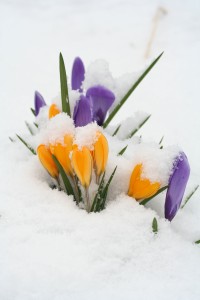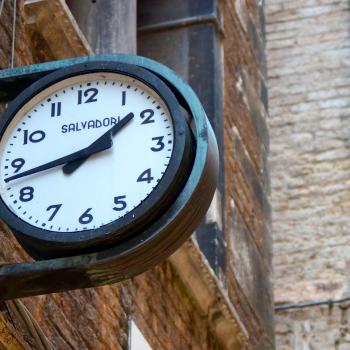 It’s January, but the weatherman says the temperatures will creep up near seventy for the next day or two. In fact, things have been warmer than usual for a spell now. Tiny buds are popping out on some of the trees, and croci (yes, a bunch of crocuses) are spackling the earth in little paintbrushes of yellow and purple. The birds, from black starling to blue jay, are wild about it all.
It’s January, but the weatherman says the temperatures will creep up near seventy for the next day or two. In fact, things have been warmer than usual for a spell now. Tiny buds are popping out on some of the trees, and croci (yes, a bunch of crocuses) are spackling the earth in little paintbrushes of yellow and purple. The birds, from black starling to blue jay, are wild about it all.
This shouldn’t be happening, of course, because this is the mid-Atlantic, and the average temperature this time of year is in the low forties. The skies should stay dark and unruly for weeks to come. Windshields should be sheathed in icy skins that have to be chafed and busted off with barely-effective scrapers that send shivers of freezing pellets down your shirtsleeve.
The ride to work should be intolerable, the seat a glacier beneath your pant legs and too frost-bound to lean back against. The heater controls should take a merciless pounding as you demand more from them than they can possibly give in such tundral conditions.
But that’s not happening right now. Right now, the car windows are down a tad to let in a waft of fresh air, like an old friend finally come to call. Right now, you walk to places instead of drive, and find a way to get out during the noon break. There’s no need for a big coat pinning your arms down or a scratchy scarf rubbing your neck raw. Free of thick, globby Chapstick, lips can be used to whistle.
Hailing from far, far south of here, I love this occurrence. I despise cold weather, though to my dismay I’ve found myself living in wintry places for the past twenty years.
I even spent two of them in New England, where the snow started in October and didn’t melt its dirty, icy slush out of the parking lots and shady areas until sometime in May. In those two years, I shoveled more snow out of the drive than I’d seen in my entire lifetime and that of my parents put together. It nearly killed me.
So I’ve been relishing this little reprieve from the dreaded season—a sprightly, active burst of time, pert as a puppy who’s found his balance.
But wouldn’t you know it, I had to go and hear what you call such a happening as this. It’s known as a false spring, and the consequences of such a phenomenon are substantial.
Tender shoots sent forth in midwinter are assured of being burned by the freezing temperatures all but certain to return. This hurts the blooming season considerably and retards fruit-bearing a great deal.
Even more serious is what occurs underground. For in addition to the new green growth we see at these times, roots are tricked into venturing forth, burrowing into softer, warmer ground that will soon lock them in a concrete case again. Any young tree that makes the mistake of trying to grow in a false spring places itself in mortal danger.
This all puts me in mind of Robert Frost’s poem, There are Roughly Zones, in which the narrator sits inside his house and worries about the effects of a northwest wind and freezing temperatures on a sapling that the family had planted:
We think of the tree. If it never again has leaves,
We’ll know, we say, that this was the night it died.
It is very far north, we admit, to have brought the peach.
What comes over a man, is it soul or mind—
That to no limits and bounds he can stay confined?…
Why is his nature so hard to teach
That though there is no fixed line between wrong or right,
There are roughly zones whose laws must be obeyed?
Nature is naïve it seems, both in the physical world and in the heart of man.
We’re easily fooled by conditions, and what seems true is often only ostensibly so. Dupes who can’t be taught, we take our cues from our surroundings instead of the calendar, and we test our environs with today as a measure rather than with the sum of all days.
What has history said happens at such an hour, when thus are the makings of the world? Regardless, we either don’t care or don’t have sense enough to consult it. Instead, we childishly deem ourselves free of science, of gravity, or of what chronicles have foretold, all because it seems warm enough, bright enough, safe enough.
So we walk into lions’ cages because they’re wearing collars and sit upon circus pedestals. We dive headfirst from rocks because the water looks black and deep.
In and on we go, damn it. We will not delay. Waiting, having patience, judging the circumstances—is for the meek, we hear it said. Take the hour! Seize the moment!
And how often do we learn, at our great and mortal cost, that it was not, in fact, the time for what we’ve attempted; that it was premature to do or say a certain thing; that the venture was rash, not courageous; that the words imparted were not so much sage as sudden, or that they wounded rather than righted.
Sung first in Ecclesiastes and then in Frost’s refrain: There is a time for all things. And if it is not heeded, a correction is in order, one that clips the impudence of overreaching. It’s hard to learn how to wait, and even harder to learn the signs that counsel it. Perhaps that’s because, like the hasty buds of January, we fear the arrival will never happen, then try to force its hand.
Endurance, reserve, must be practiced. We have to learn the wisdom of lingering. Spring will come, but only on her own terms—honest as a nun in her vows—and at her stately, sure pace—without setting a foot wrong—without the falseness and faithlessness that burn and betray.














